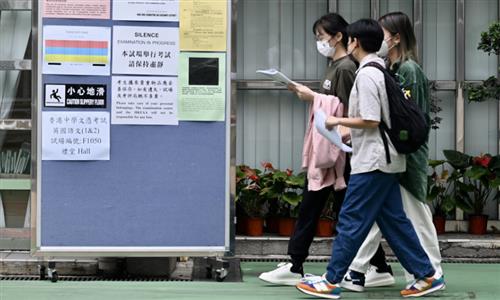ARTS / CULTURE & LEISURE
Book sale boosts confidence in flood-hit city in N.China

A visitor takes a look at the books at the 29th Beijing International Book Fair on June 16, 2023. Photos: VCG
In August, the city of Zhuozhou in North China's Hebei Province was hit by extreme floods. Hundreds of publishing warehouses in the city were badly damaged by torrential rain, causing heavy economic losses. To help with recuperation efforts, a spring book warehouse sale was held in Zhuozhou on Saturday, attracting book lovers from all over the country and boosting the vitality and confidence of the local publishing industry. A total of around 2 million books were on sale.
Struck by the once-in-a-century torrential rainfall, the Beijing-Tianjin-Hebei region and some other areas in northern China were severely impacted. In the hardest-hit city of Zhuozhou, more than 130,000 people were affected and 146 villages and communities impacted, covering an area of 225.38 square kilometers.
A convenient transportation hub close to Beijing, Zhuozhou is located in the core area of the Beijing-Tianjin-Hebei synergistic development region. This sets it up for fast logistics and distribution with Beijing, allowing library distributors to set up warehouses in the city to provide book distribution services in Beijing in a convenient and efficient manner.
Therefore, Zhuozhou is home to hundreds of publishing house book warehouses. However, nearly all of them were flooded. According to media reports, at least several million books were affected by the floods.
Over the past six months, local authorities have introduced a series of measures to help businesses return to normal operations, such as coordinating insurance, reducing rent and providing subsidized loans. As part of the series of measures to alleviate the impact of the disasters, this spring book warehouse sale not only brings people together to bond over books but also boosts confidence in local book enterprises.
The warehouse sale entertains a complete range of books in humanities, social sciences, and children's works with a stock of more than 2 million volumes, drawing book enthusiasts to visit from different parts of the country.
"It's really worth it. The variety and quantity of books here far exceeded my expectations," said a visitor from Heze, East China's Shandong Province.
"Now our sales revenue has recovered to about 85 percent of what it was before the flood. We have sufficient confidence to stay in Zhuozhou and we are confident that our company will develop well here," said a local book enterprise at the sale.
According to media reports in August, Bookschina.com, the biggest online book store in China, revealed 400 million of its books had been soaked by the floods in Zhuozhou, describing it was "the most devastating damage in the company's 25-year history." The platform moved its warehouse center to Zhuozhou in 2018. Since the warehouse flood on August 1, nearly 80 percent of its books have been damaged, including a number of rare, out-of-print and vintage titles. These books are relatively niche, not mass bestsellers. The number of books per edition is small, and when they are damaged, there is no longer any call to reprint them.
Many companies have tried various ways to make up for the losses such as sales through live streaming. Many readers reached out and are ready to help them by buying pre-sale goods. Some book lovers also showed their support by purchasing special "aid packages" consisting of books, commemorative bookmarks and badges.



